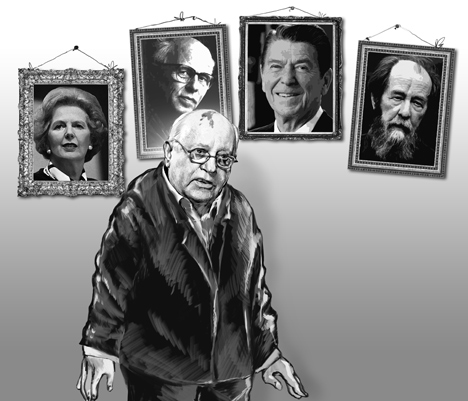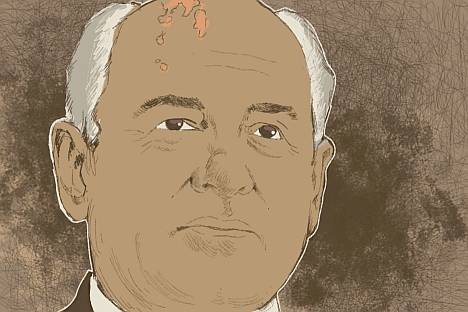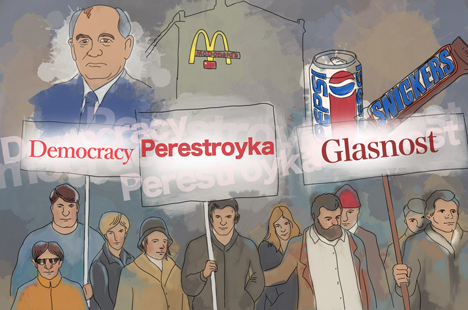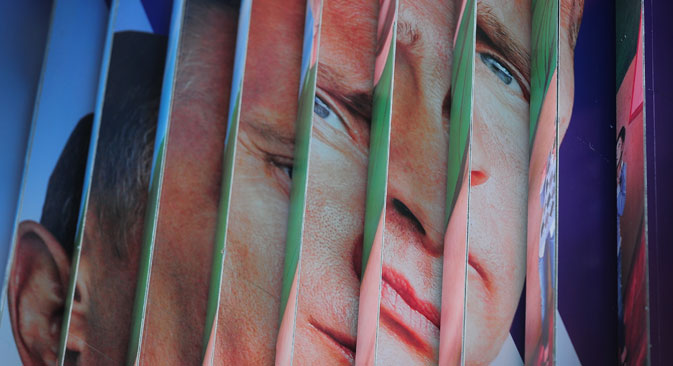Perestroika 30 years on: Analyzing the consequences for modern Russia
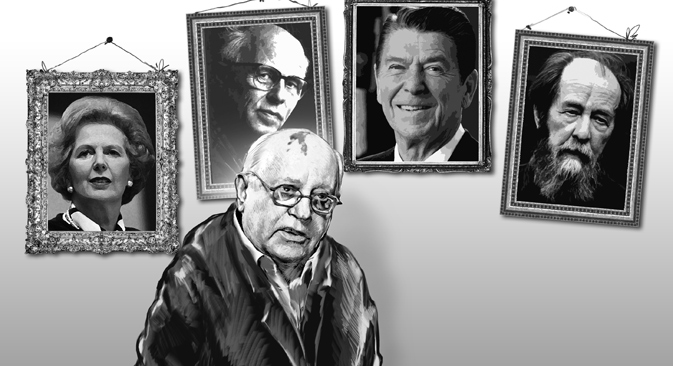
{***Former spokesman for Gorbachev: 30 years on, perestroika’s revolution remains misunderstood in Russia***}
Click to enlarge the image. Drawing by Tatyana Perelygina
30 years on, perestroika’s revolution remains misunderstood in Russia
Andrei Grachev, special to RBTH
A full thirty years after Mikhail Gorbachev set the USSR on an irreversible trajectory toward a more open, humane society – and ultimately, toward the country’s dissolution – many Russians continue to reject the idea that perestroika represented a step forward for the country, especially in terms of its geopolitical consequences. In an RBTH exclusive, Gorbachev’s former press secretary Andrei Grachevasks why the perestroika era remains such a controversial part of the nation’s history.
The attitude to perestroika, its outcomes and consequences in Russia remains controversial even now. The "Gorbachev paradox" is that both the opponents and many of the supporters of the Soviet Union’s last leader believe the perestroika that he launched ended in a failure. Consequently, some damn Gorbachev for what he managed to achieve, while others blame him for the fact that he did not fulfill all his promises.
Most of all, the initiator of perestroika is accused of inconsistency, wavering and tactical zigzags. His cautiousness, his yearning to propel society forward by giving it the opportunity to ripen for change, to push it from behind, rather than to lead, were perceived by many as inconsistency and indecisiveness.
However, if one tries to connect at least the major changes that have taken place over those years in the former Soviet Union and throughout the world with a dotted line, the zigzags of the "indecisive" Gorbachev would stretch in almost a straight line... I will name the fact that, in my opinion, is perestroika's "insoluble residue": Russia took a bite from the "apple" of free elections and glasnost, having included the right to freedom of expression and information in its list of public priorities.
The price of reform
Having dropped its claims for an alternative civilization and global submission to its ideological doctrine, Moscow took the initiative to end the Cold War, which had almost led to a third world war. The result of these years was the actual reunification of world history, which split into two streams in the early 20th century, after the Russian Revolution.
However, in our mortal world, everything has its price. The price that, against his will, Gorbachev paid for the transformation of his own country and world politics was the collapse of the Soviet Union and his own resignation.
The Western world, in turn, could not resist the temptation to declare itself the absolute winner in the Cold War and the sole heir to history. As a result, Gorbachev’s Western partners, on whose common sense, even more than financial assistance, he hoped, proved no more reliable allies than his former party colleagues who had betrayed him.
The legacy of perestroika
Today, Gorbachev blames the West not for the failure of its leaders to provide sufficient help to him (he knows that it was not them that on which the fate of perestroika depended), but for its inability to sensibly use the unique chance that his new policy opened to the world, for perceiving the move of Soviet society toward democracy only as a manifestation of inner weakness.
Neither the project of the "common European home," part of which the reformed Soviet Union was to become, nor the idea of creating new structures of collective security on the continent (including the possible Security Council), which would help to avoid the tragedy of the bloody war in Yugoslavia, and the drama of the current civil conflict in Ukraine, were implemented.
It turned out that it was easier to destroy the Berlin Wall itself than to do away with the logic that spawned it and the psychology of programmed enmity as an instrument of policy.
Returning ghosts
The preservation of old visible and invisible walls and barriers and the emergence of new ones shows that in the 21st century, politicians – both of the West and the East – are not ready to abandon their prejudices and stereotypes. It is clear that this is the reason the Cold War was replaced by numerous "hot" conflicts around the world.
And the former, faded old Cold War that Gorbachev believed that he was burying for good during his meetings in Reykjavik, in Malta, in Washington or Moscow with past American presidents is rapidly returning to Russian-American relations.
If 30 years after the beginning of perestroika, it is seen in Russian society as a political failure or even as a subversive anti-national project, it means that the main motive of perestroika, actively supported at the time by the entire Soviet society – a project of the reunification of Russia with world history and the democratic renewal of the country – is either misunderstood or is being consciously rejected. As are pluralism of opinion, the rule of law, fair elections of leaders, the inviolability of the human person, real competition in politics and economics and government accountability to the public.
The author is a former spokesman for Soviet President Mikhail Gorbachev.
{***Political analyst: Why perestroika’s legacy continues to shape the post-Soviet world***}
Why perestroika’s legacy continues to shape the post-Soviet world
Fyodor Lukyanov, Rossiyskaya Gazeta
Fyodor Lukyanov argues that the development of Russia’s current anti-Western position and foreign policy was inevitable given the response of the West to the collapse of the USSR in the wake of perestroika – but that pursuing an ideology based upon suspicion and mistrust combined with efforts to reshape the historical narrative is ultimately a false course.
Click to enlarge the image. Drawing by Grigory Avoyan
Perestroika and "new political thinking" became a unique phenomenon. Disputes about perestroika will never lead to a final verdict on what it was and why – the consequences were on too large a scale and clearly unintended. Today, amid a bitter conflict between Moscow and the West over Ukraine, what was believed to be perestroika’s most important achievement – the end of the Cold War and the exit from a systemic confrontation – now also raises serious doubts.
Gorbachev’s principle of "New Thought" was so idealistic that most observers could not believe in its seriousness for long. One can discuss the degree of professionalism wielded by the country’s leadership, the impact of the economic crisis, the combination of circumstances, but this does not negate the main point. The Kremlin really believed that – on the basis of universal values and the advanced demonstration of goodwill – it was possible not only to stop the confrontation and eliminate ideological oppression, but also to agree to build a different world – a fair and equal one.
Swings and roundabouts
The political pendulum swings, and the farther it goes in one direction, the quicker it goes back. The atmosphere of today's Russia is the opposite of the one that prevailed during the Soviet perestroika. Instead of idealism, there is exceptional realism, sometimes in its extreme manifestations. Disbelief in any tools and mechanisms, except for one’s own strength. Not merely an absence of trust in the West, but also the refusal to recognize any motives for their actions except hostile and selfish ones.
There is no reason to be surprised. Perestroika did not end as its authors intended. Consequently, attempts to overcome the collapse of one state and build another became the content of the next period in Russia. The opponents of the Soviet Union won. It is pointless to be indignant at the fact that they tried to make the most out of it – who would have acted differently in their place?
Had the USSR won the Cold War, it would hardly have hesitated whether to accept the Netherlands or Portugal into the Warsaw Pact. But moreover, it would have been strange to expect that, after this experience, the Russian authorities would retain any illusions about the desire of the powerful to limit themselves by their own will. And to believe sweet speeches that a "zero sum game" no longer exists. I won't even talk about the lessons of "humanitarian interventions…" The fruits of all these events are that Russia today, perhaps, is more wary of the outside world than the Soviet Union before perestroika.
The dangers of a failure to reflect
The rollback from the idealistic interpretation of the world is explainable. It is worrying that the "hyperrealism" of betrayed hopes is generating schematization and extreme simplification. Dissatisfaction with the result of perestroika forces the national consciousness to see it and its consequences not as a stage in the country's development, determined by the laws of nature and logic of preceding events, but as some aberration, something almost alien.
It is human nature to idealize the past, especially when a person is not happy about the present and the future is still swathed in mist. Russian society lacks reflection, which has nothing to do with either the comforting gloss placed on the path already trodden, or the masochistic spitting on it. The groping for a new national identity is currently leading to attempts to adapt history – especially recent history – to the needs of "historical optimism," that is to avoid an objective understanding of its tragic or multidimensional, ambiguous pages.
Perestroika ended dramatically. But this drama is worthy to be evaluated not only its geopolitical or socio-economic way, but as a very important moment for this country – of a human impulse, a desire for renewal and purification. Whatever mistakes were made, however they were used by anybody in their own interests, the role of such episodes in the history is invaluable. Perestroika showed what an overabundance of idealism and faith in human nature leads to. Now we seem to be approaching the realization of another truth – that it is also impossible to build something sustainable on pragmatism and mistrust alone.
The author is the editor in chief of Russia in Global Affairs and chairman of the Presidium of the Council on Foreign and Defense Policy, a non-governmental think tank.
First published in Russian in Rossiyskaya Gazeta.
All rights reserved by Rossiyskaya Gazeta.
Subscribe
to our newsletter!
Get the week's best stories straight to your inbox
